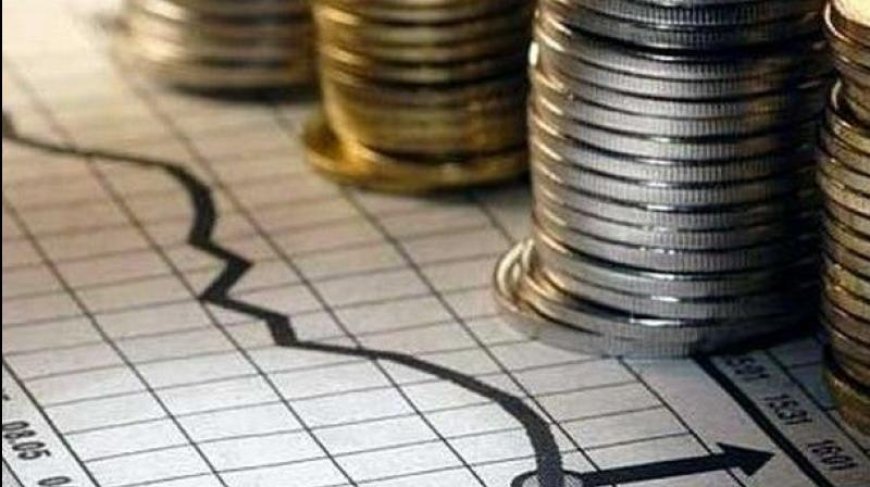India’s Fiscal Deficit Stands at Rs 8.5 Lakh Cr, 52.5 PC of Budget Target
Last year, the government adopted a new methodology for calculating GDP numbers, which better captures the value addition made in the supply chain.Last year, the government adopted a new methodology for calculating GDP numbers, which better captures the value addition made in the supply chain.New Delhi: Crossing the halfway mark in the first eight months of the year, India’s fiscal deficit stood at Rs 8.5 lakh crore or 52.5 percent of the Budget target. As part of its strategy to continue on the path of fiscal consolidation, the Centre, however, has set a fiscal deficit target of 4.9 per cent of GDP for the financial year ending in March 2025. This followed an improvement over the previous year's deficit target, which was set at 5.6 per cent of GDP. “The gap between expenditure and revenue amounted to Rs 8.46 lakh crore or 52.5 percent of the estimate for the financial year during the period from April to November, compared to the total limit set at Rs 16.13 lakh crore for the ongoing fiscal year. This compares to Rs 9.07 lakh crore during the same period last year,” the Controller General of Accounts’ provisional data said. “Net tax receipts for the first eight months of the current financial year were at Rs 14.43 lakh crore, or 56 per cent of the annual target, compared with Rs 14.36 lakh crore for the same period last year. Also, the total government expenditure for the eight months was Rs 27.41 lakh crore, or about 57 per cent of the annual goal. The government spent Rs 26.52 lakh crore in the same period last year,” the data showed. The data further showed that till November, the government’s capital expenditure, or spending on building physical infrastructure, was Rs 5.13 lakh crore, or 46.2 per cent of the annual target, as against Rs 5.86 lakh crore for the same period a year earlier. As far as the fiscal deficit is concerned, it was supported by the Reserve Bank of India’s (RBI’s) dividend payment earlier this year, and a reduction in capital expenditure. The RBI paid Rs 2.1 lakh crore as a dividend to the central government for fiscal year 2024, marking the highest surplus ever recorded. As announced by finance minister Nirmala Sitharaman in the Union Budget 2024-25, the Centre’s fiscal deficit target was 4.9 percent of the gross domestic product (GDP) for 2024-25 (FY25) as against 5.6 per cent in 2023-24, which was lower than the revised estimates of 5.8 per cent. According to Aditi Nayar, chief economist and head - research & outreach, ICRA Limited, in April-November FY2025, the net tax revenues rose by a marginal 0.5 per cent Y-o-Y (dampened by the additional devolution of taxes to the states), non-tax revenues expanded by ~50 per cent boosted by the RBI dividend, and revenue expenditure grew by 7.8 per cent, while capex continued to contract by 12.3 per cent. “Gross tax collections rose by 10 per cent on a YoY basis in November 2024. While corporate tax collections have been tepid, falling by one per cent YoY in April-November FY2025, income tax collections have expanded by 24 per cent during this period, although these trends may have been partly distorted by the timing of refunds,” Nayar said.


New Delhi: Crossing the halfway mark in the first eight months of the year, India’s fiscal deficit stood at Rs 8.5 lakh crore or 52.5 percent of the Budget target. As part of its strategy to continue on the path of fiscal consolidation, the Centre, however, has set a fiscal deficit target of 4.9 per cent of GDP for the financial year ending in March 2025. This followed an improvement over the previous year's deficit target, which was set at 5.6 per cent of GDP.
“The gap between expenditure and revenue amounted to Rs 8.46 lakh crore or 52.5 percent of the estimate for the financial year during the period from April to November, compared to the total limit set at Rs 16.13 lakh crore for the ongoing fiscal year. This compares to Rs 9.07 lakh crore during the same period last year,” the Controller General of Accounts’ provisional data said.
“Net tax receipts for the first eight months of the current financial year were at Rs 14.43 lakh crore, or 56 per cent of the annual target, compared with Rs 14.36 lakh crore for the same period last year. Also, the total government expenditure for the eight months was Rs 27.41 lakh crore, or about 57 per cent of the annual goal. The government spent Rs 26.52 lakh crore in the same period last year,” the data showed.
The data further showed that till November, the government’s capital expenditure, or spending on building physical infrastructure, was Rs 5.13 lakh crore, or 46.2 per cent of the annual target, as against Rs 5.86 lakh crore for the same period a year earlier.
As far as the fiscal deficit is concerned, it was supported by the Reserve Bank of India’s (RBI’s) dividend payment earlier this year, and a reduction in capital expenditure. The RBI paid Rs 2.1 lakh crore as a dividend to the central government for fiscal year 2024, marking the highest surplus ever recorded.
As announced by finance minister Nirmala Sitharaman in the Union Budget 2024-25, the Centre’s fiscal deficit target was 4.9 percent of the gross domestic product (GDP) for 2024-25 (FY25) as against 5.6 per cent in 2023-24, which was lower than the revised estimates of 5.8 per cent.
According to Aditi Nayar, chief economist and head - research & outreach, ICRA Limited, in April-November FY2025, the net tax revenues rose by a marginal 0.5 per cent Y-o-Y (dampened by the additional devolution of taxes to the states), non-tax revenues expanded by ~50 per cent boosted by the RBI dividend, and revenue expenditure grew by 7.8 per cent, while capex continued to contract by 12.3 per cent.
“Gross tax collections rose by 10 per cent on a YoY basis in November 2024. While corporate tax collections have been tepid, falling by one per cent YoY in April-November FY2025, income tax collections have expanded by 24 per cent during this period, although these trends may have been partly distorted by the timing of refunds,” Nayar said.






































